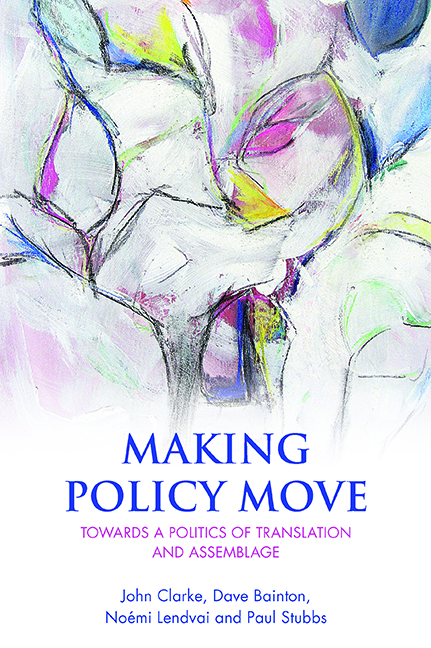Book contents
- Frontmatter
- Contents
- Introduction
- One Moving policy studies
- Two Translation, assemblage and beyond: towards a conceptual repertoire
- Three Performing reform in South East Europe: consultancy, translation and flexible agency
- Four The managerialised university: translating and assembling the right to manage
- Five Soft governance, policy fictions and translation zones: European policy spaces and their making
- Six Translating education: assembling ways of knowing otherwise
- Seven ‘Policy otherwise’: towards an ethics and politics of policy translation
- References
- Index
Seven - ‘Policy otherwise’: towards an ethics and politics of policy translation
Published online by Cambridge University Press: 07 March 2022
- Frontmatter
- Contents
- Introduction
- One Moving policy studies
- Two Translation, assemblage and beyond: towards a conceptual repertoire
- Three Performing reform in South East Europe: consultancy, translation and flexible agency
- Four The managerialised university: translating and assembling the right to manage
- Five Soft governance, policy fictions and translation zones: European policy spaces and their making
- Six Translating education: assembling ways of knowing otherwise
- Seven ‘Policy otherwise’: towards an ethics and politics of policy translation
- References
- Index
Summary
Introduction
In this final chapter, we return to thinking and writing collaboratively in order to develop our approach of ‘making policy move’ in several ways. First, we reflect on the four ‘case study’ chapters to draw out some general observations about what has been gained by putting our vocabulary for policy analysis to work. Then, we explore the implications of thinking through assemblage and translation for ‘policy otherwise’: asking what sorts of possibilities such an approach brings into view. In the third section, we take these concerns back to the case study chapters to ask what ‘policy otherwise’ might look like in those settings: how might they be assembled and translated differently? These comments are intended as brief reflections that point to the possibilities of ‘otherwise’, rather than programmatic statements, strategies or grand plans. Finally, we end – as our collaboration began – in conversation, with a transcription of a discussion at our last meeting (in Veszprém, Hungary) in February 2014. In that conversation, we explore some of the key issues and concerns that have shaped our work together and worry about some of their implications. This seems like an appropriately conversational and open-ended finale to an unfinished – and unfinishable – project.
Tales of translation and assemblage
In the four substantive chapters, we have put elements of our vocabulary of ‘policy in motion’ to work in exploring four very different cases: global education policy in Ladakh; policy consultancy in South East Europe; the translation of social inclusion between the European Union (EU) and Hungary; and the managerialisation of universities in England. These are diverse cases – in their subject matter, in their settings and in our approaches to them. Nevertheless, we are convinced that each of them bears witness to the value of examining policy through the lenses of assemblage and translation. Most obviously, approaching policy through translation illuminates what is at stake as policy travels from place to place. Ideas of policy transfer and diffusion largely ignore what happens as policy travels and transmutes in linguistic, symbolic and cultural forms – as it is actively translated between one site and another (in which the intimate relationships between language, culture, power and politics are always in play).
- Type
- Chapter
- Information
- Making Policy MoveTowards a Politics of Translation and Assemblage, pp. 187 - 228Publisher: Bristol University PressPrint publication year: 2015



